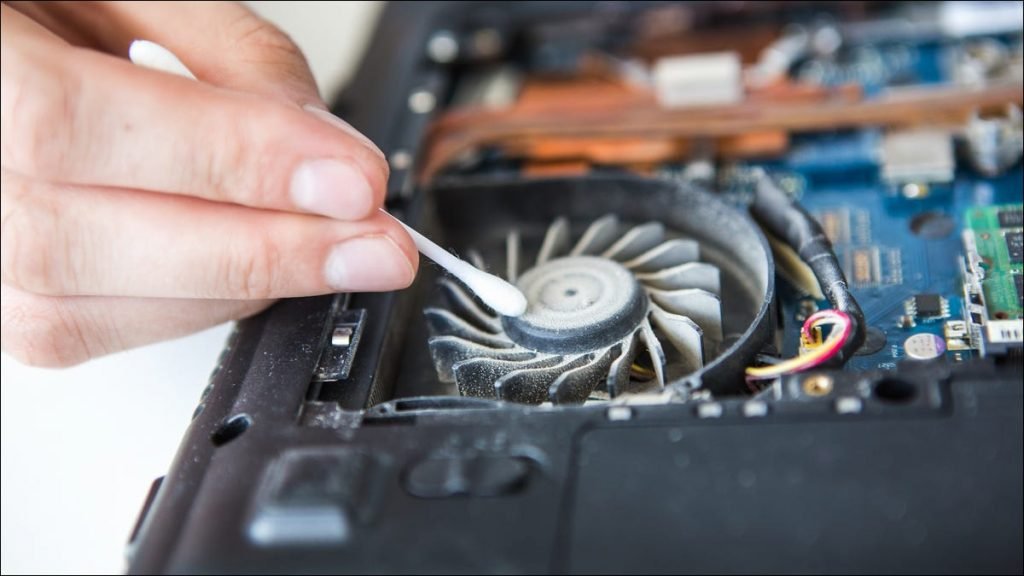Laptops are an essential part of our daily lives, but they can overheat, causing performance issues and reducing their lifespan. Overheating can also cause discomfort while using the laptop, making it uncomfortable to work or play games. In this article, we’ll discuss how to keep your laptop cool and prevent overheating.
Why do Laptops Overheat?
Laptops can overheat due to several reasons, including poor ventilation, high usage, and laptop hardware problems. The laptop’s internal components generate heat, which must be dissipated to prevent overheating. When the laptop’s cooling system becomes clogged with dust or doesn’t have adequate airflow, it can’t dissipate heat effectively, causing the laptop to overheat.
Use a Laptop Cooling Pad:
One of the easiest ways to keep your laptop cool is to use a laptop cooling pad. These pads have fans that help dissipate heat from the laptop and improve airflow. They also elevate the laptop, making it easier for air to circulate under the device.
Clean Your Laptop Regularly:
A clogged cooling system is one of the main reasons why laptops overheat. Cleaning your laptop regularly can help prevent this. Use a soft brush or compressed air to remove dust and debris from the vents and fans. This will improve the cooling system’s efficiency and reduce the risk of overheating.
Reduce High Usage:
High usage, such as playing games or running demanding applications, can cause your laptop to overheat. If you use your laptop for these tasks, take regular breaks to allow it to cool down. You can also adjust your laptop’s power settings to reduce its performance when not in use, which will help prevent overheating.
Avoid Blocking Vents:
The vents on your laptop are designed to dissipate heat, so blocking them can cause overheating. Make sure that there is adequate space around your laptop to allow air to circulate. Using a laptop on a soft surface, such as a bed or couch, can also block the vents and cause overheating.
Upgrade Your Laptop’s Cooling System:
If your laptop is still overheating despite following these tips, it may be time to upgrade your cooling system. You can purchase a new fan or cooling pad to improve airflow, or you can have a professional clean and upgrade your laptop’s cooling system.
FAQ’S
Q: What are the causes of overheating in a laptop?
A: Overheating can be caused by several factors such as dust buildup in the ventilation system, high usage of processor-intensive applications, poor air circulation, running multiple applications at once, or a faulty cooling system that needs repairs from a computer repairs shop.
Q: How can I keep my laptop cool and prevent overheating?
A: Clean the ventilation system regularly, use a laptop cooling pad, avoid using heavy applications for an extended period, keep the laptop on a flat surface for proper air circulation, and reduce the use of external devices that generate heat.
Q: Is using a laptop cooling pad effective in preventing overheating?
A: Yes, using a laptop cooling pad can help improve air circulation and reduce the overall temperature of the laptop.
Q: Can dust buildup in the ventilation system cause overheating?
A: Yes, dust buildup in the ventilation system can cause overheating by clogging the air vents and reducing the air circulation.
Q: Can running multiple applications at once cause overheating?
A: Yes, running multiple applications at once can increase the processing power required by the laptop and lead to overheating.
Q: Is it okay to use my laptop on soft surfaces like a bed or couch?
A: No, soft surfaces can block the air vents and reduce air circulation, causing overheating. It is best to use the laptop on a flat, hard surface.
Q: What can I do if my laptop is already overheating?
A: If your laptop is already overheating, immediately close all applications and turn off the laptop. Let it cool down for a few minutes before turning it back on.
Q: Are there any software tools that can help prevent overheating?
A: Yes, some laptops come with built-in software tools to monitor the temperature and adjust the performance accordingly to prevent overheating. Additionally, there are third-party software tools available that can monitor the temperature and help prevent overheating.
Conclusion:
Laptops can overheat for several reasons, but following these tips can help prevent overheating and keep your laptop running smoothly. Regular cleaning, using a laptop cooling pad, reducing high usage, avoiding blocking vents, and upgrading your cooling system are all effective ways to keep your laptop cool. With these tips in mind, you can enjoy the benefits of your laptop without worrying about overheating.
